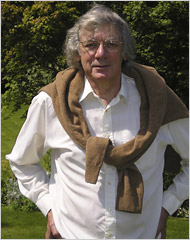| Want to send this page or a link to a friend? Click on mail at the top of this window. |
| Posted January 13, 2008 |
| The Nature of Reasons: Two |
| Philosophers Feud Over a Book Review |
 |
 |
||
INGRID HONDERICH |
COLINMcGINNBLOG.COM |
||
| Ted Honderich | Colin McGinn |
By PATRICIA COHEN |
OVER the ages, philosophy has offered valuable guidance on profound questions of truth, beauty and existence, yet still unresolved is the conundrum of how to respond to a bad book review.
This neglect no doubt has helped contribute to a feud between the prominent philosophers Colin McGinn and Ted Honderich. That, and perhaps a slight to an ex-girlfriend 25 years ago, terror in the Middle East and, oh yes, a fundamental disagreement on the nature of consciousness.
The spat started in the summer, when Mr. McGinn, a British-born philosophy professor at the University of Miami, wrote a scathing review of Mr. Honderich’s book “On Consciousness” in the July 2007 issue of The Philosophical Review, a quarterly journal edited by the faculty of the Sage School of Philosophy at Cornell University.
“This book runs the full gamut from the mediocre to the ludicrous to the merely bad,” Mr. McGinn wrote. “It is painful to read, poorly thought out and uninformed.” He called Mr. Honderich’s efforts “shoddy, inept and disastrous.”
Just in case doubt about his position remained, Mr. McGinn added a note: “The review that appears here is not as I originally wrote it. The editors asked me to ‘soften the tone’ of the original; I have done so, though against my better judgment.”
| _____________________ | |
| One academic accuses another of personal motives. | |
| _____________________ |
In an e-mail message, Mr. Honderich said he had petitioned the review to provide “some fair redress,” like a discussion on the subject, but was told by the editor in chief, Nicholas L. Sturgeon, that the policy is “not to publish replies to book reviews.” Mr. Honderich said he appealed that decision to members of the editorial board two weeks ago and was waiting for a response.
“They have brought their own journal into disrepute and should do something about that,” he said.
The brouhaha has livened up the generally more sober exchanges among philosophers over the past six months as they have debated, on blogs and in e-mail, the tone, the content and the possible motives (besides scholarly judgment) Mr. McGinn might have had. The two philosophers have also continued their argument about the nature of consciousness with essays published on the popular Leiter Reports: A Philosophy Blog, with plenty of comments from spectators (leiterreports.typepad.com). In London, the continuing battle even bubbled up to the pages of The Guardian.
Mr. Honderich, a professor emeritus at University College London and the editor of “The Oxford Companion to Philosophy,” accused Mr. McGinn of being motivated by personal animus. The two professors were colleagues at London College 25 years ago, and Mr. Honderich maintains that Mr. McGinn has never forgiven him for calling an ex-girlfriend of his “plain.” Reached in Miami, where he said he was in the middle of reviewing another book, Mr. McGinn described the notion that he was motivated by a decades-old grudge as “absurd.” “We didn’t get on philosophically,” he said, “but from a personal point of view, we got on perfectly fine.”
Mr. Honderich, he said, “maintains the review was so negative because there’s a feud instead of because his book is so bad.” He said that he remembered the comment about his ex-girlfriend, but that he considered it no more than a “bit vulgar and crass” and “certainly didn’t nurse it for 25 years.”
“There was no feud before. It was just a negative review,” he said, acknowledging that “it was the most negative review I’ve ever written.”
Whether criticism should be so harsh is a legitimate issue, Mr. McGinn said. He said that though some might call him aggressive, “rightly or wrongly it was my intellectual judgment.”
The view from Cornell, The Philosophical Review’s home, is that the fuss is overblown. Mr. Sturgeon said that Mr. McGinn had been chosen to review the book, published in 2004, because “he is a recognized expert on issues of consciousness.” The review did prompt a discussion among the editors, Mr. Sturgeon said, which was why they asked Mr. McGinn to take out a parody of Mr. Honderich’s writing style.
“I can understand Honderich’s being aggrieved” by the review, Mr. Sturgeon said, “but it is not outside the accepted standards of the discipline.”
“The review is unusual,” he added, but “by no means unprecedented.”
| _______________________ | |
| Ted Honderich and Colin McGinn share history. And choas. | |
| _______________________ |
The question of publishing a further exchange was raised at a departmental meeting last month attended by nearly all the members of the editorial board, Mr. Sturgeon said, and everyone agreed there was no compelling reason to make an exception to the journal’s policy.
On questions of philosophy, the two professors stand in opposing camps. Mr. Honderich argues that one’s consciousness of external reality is “in a sense constituted by that reality,” a position he calls “radical externalism.” Mr. McGinn maintains that some philosophical questions — like the nature of consciousness — are beyond human understanding. This view of Mr. McGinn and others has been called the New Mysterianism, after a ’60s rock band.
Mr. McGinn has expressed his disdain for Mr. Honderich’s work before. In 1990 he wrote a review for The London Review of Books of a collection of papers by the philosopher A. J. Ayer that included the eulogy Mr. Honderich had given at Mr. Ayer’s funeral. Mr. McGinn called it “ill-written, plodding and faintly nauseating in places.”
Mr. Honderich took the opportunity to characterize his erstwhile colleague in his 2001 autobiography, “Philosopher: A King of Life,” writing, “The envy of my small colleague Colin McGinn, also vegetarian, extended even to wanting to be Martin Amis.” (Mr. McGinn also writes novels.)
Via e-mail, Mr. Honderich said that Mr. McGinn’s animus was also rooted in Britain’s class structure and that Mr. McGinn had a “chip on his shoulder.” Speculating on why The Philosophical Review published the critique, Mr. Honderich said it might have to do with “my moral defense of Palestinian terrorism against neo-Zionism,” or “my Zionism.”
In his 2002 book “After the Terror,” Mr. Honderich argued that Palestinians had a moral right to use terrorism to resist Israel and that the West shared responsibility for the 9/11 attacks. “Did we bring the killing at the twin towers on ourselves? Did we have it coming? Those offensive questions, and their offensive, but affirmative, answer, do contain a truth.”
Mr. Sturgeon dismissed such speculation, saying he and others at The Review had no idea Mr. Honderich had written anything political.
In the end, Mr. Honderich said, “the tubful of personal insults by McGinn has had a good effect on me.” He added, “It has made me see that objections already familiar to me, mainly by contributors to a book about my theory, have to be given more attention.”
Copyright 2008 The New York Times Company. Reprinted from The New York Times, THEARTS, of Saturday, January 12, 2008.
| Wehaitians.com, the scholarly journal of democracy and human rights |
| More from wehaitians.com |